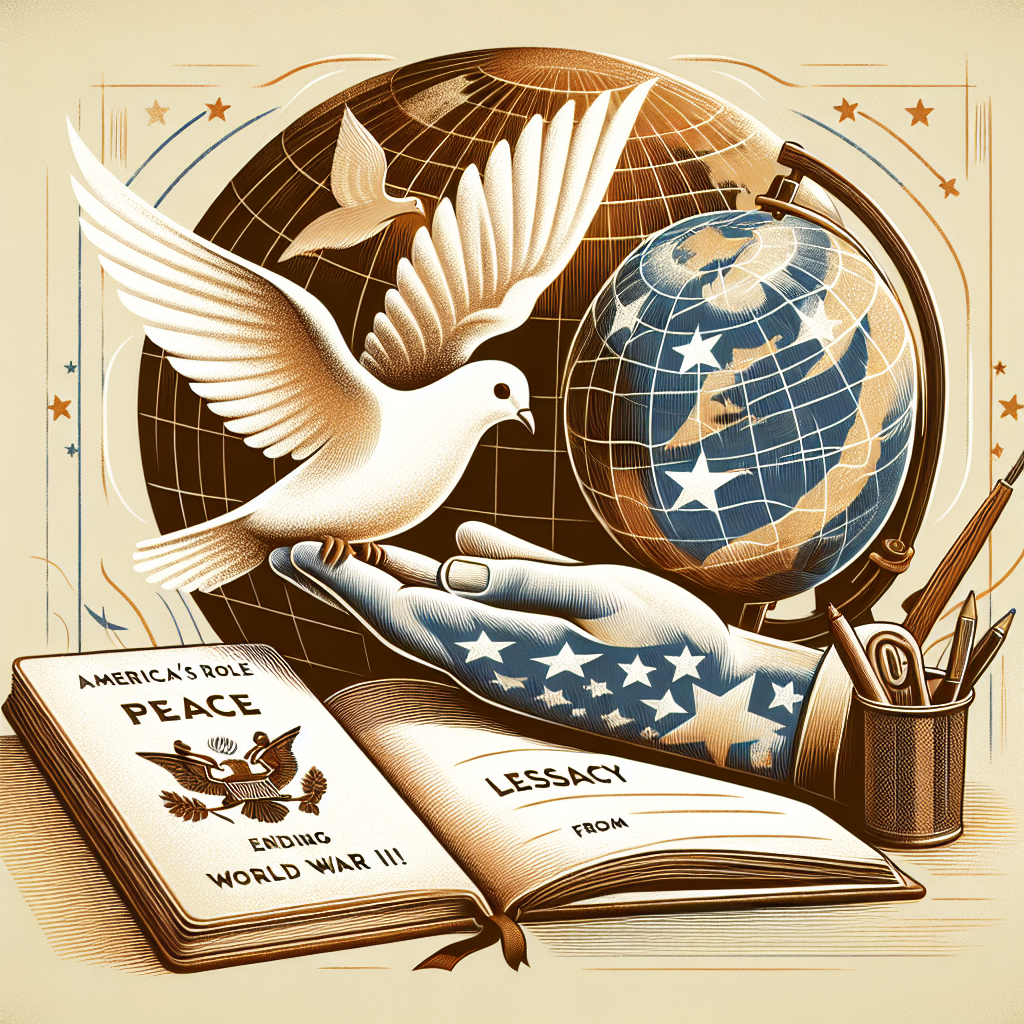America's Role in Ending World War II: Legacy and Lessons from May 8, 1945

Unveiling America's Pivotal Role in Ending World War II: The Indelible Legacy and Lessons from May 8, 1945
As the tides of history ebb and flow, certain watersheds leave imprints too profound to be washed away. One such epochal event is the conclusion of World War II, a chaotic chapter of human history where the strength and determination of nations were put to a severe test. Central to the narrative of this global conflict's resolution is America's instrumental role. As we delve into the riveting tale of bravery, sacrifice, and strategic brilliance that marked America's contribution to the cessation of World War II, we will also explore the lasting legacy and invaluable lessons gleaned from the historic day of May 8, 1945. This is a journey not just into the annals of military and political history, but also into the heart of human resilience, unity, and the indomitable spirit of a nation that helped shape the world as we know it today.
Introduction to America's Role in Ending World War II
World War II, one of the most intense and broadest conflicts in human history, was marked by over 70 million fatalities. It brought together the world's greatest powers divided into two opposing military alliances: the Allies and the Axis. The United States, as an integral part of the Allies, played a crucial role in ending this global conflict. The culmination of these efforts took place on May 8, 1945, known as V-E Day (Victory in Europe Day), when Nazi Germany unconditionally surrendered.
Core Principles of America's Role in Ending World War II
Entry into the War and the Shift in Power
The United States initially maintained a policy of neutrality during the early years of World War II. However, the bombing of Pearl Harbor by Japan on December 7, 1941, led to the United States' entrance into the war. This entrance not only expanded the geographical scope of the conflict but also shifted the balance of power in favor of the Allies due to America's substantial military and economic resources.
Technological Advancement and Industrial Might
America's industrial and technological strength was a key factor in ending World War II. The nation's ability to produce and supply vast quantities of weapons, ammunition, and other war materials to both its own military and its allies was unmatched. This was exemplified in programs such as the Lend-Lease Act, which allowed the U.S. to provide military aid to foreign nations during the war.
Strategic Bombing Campaigns
The United States Army Air Forces conducted strategic bombing campaigns against Germany and Japan, significantly weakening their ability to wage war. The bombings not only destroyed military targets, but also severely damaged civilian infrastructure, undermining morale and the capacity to support the war effort.
Use of the Atomic Bomb
Perhaps the most controversial aspect of America's role in ending World War II was the use of atomic bombs on the Japanese cities of Hiroshima and Nagasaki in August 1945. The devastating power of these new weapons hastened Japan's surrender, effectively ending the war.
Legacy and Lessons from May 8, 1945
The end of World War II marked the beginning of a new era, with the United States emerging as one of the world's superpowers. The end of the War also led to the onset of the Cold War, a period of geopolitical tension between the United States and the Soviet Union. One of the key lessons from America's role in World War II, and indeed from the war itself, is the devastating impact of global conflict. The war led to unprecedented destruction and loss of life, prompting a global commitment to peace and diplomacy that has largely prevailed since. The use of atomic bombs also highlighted the potential for human destruction through technological advancements, leading to debates about nuclear disarmament and non-proliferation that continue to this day. In conclusion, America's role in ending World War II was significant and multifaceted, driven by a combination of military strategy, industrial strength, technological advancement, and geopolitical maneuvering. The legacy of May 8, 1945, offers essential lessons on the costs of global conflict and the ongoing struggle for peace and stability.
Use Case 1: Teaching Resource for History Educators
The content titled 'America's Role in Ending World War II: Legacy and Lessons from May 8, 1945' is an ideal teaching resource for history educators. This comprehensive content can serve as a reference point for educators while teaching about World War II in their classes. Teachers can use the detailed information about America's role in ending the war to provide a balanced and fair perspective of events to their students. They can also use the lessons from this historical event to create engaging and interactive learning activities, such as quizzes, debates, and group discussions. Moreover, the content can also be used to create lesson plans or curriculum guides for history classes, especially for topics related to World War II. It provides a wealth of information that can be incorporated into lectures, presentations, and reading assignments.
Use Case 2: Resource for Academic Research
Academic researchers studying World War II or America's military history can utilize 'America's Role in Ending World War II: Legacy and Lessons from May 8, 1945' as a vital resource. The content provides in-depth analysis and insights about America's strategic decisions, military tactics, and their impact on the war's outcome. Researchers can use this information to support their arguments, draw conclusions, or propose new theories about the war. Whether they are writing a thesis, research paper, or dissertation, this content can provide them with reliable and valuable information.
Use Case 3: Content for Documentaries and Historical Features
Producers of historical documentaries or authors of historical features can use 'America's Role in Ending World War II: Legacy and Lessons from May 8, 1945' as a guide for their content. The comprehensive details about America's actions and decisions during the war can provide a solid foundation for a compelling narrative. The content can also be used to develop scripts, storyboards, and interviews. Furthermore, the lessons from May 8, 1945, can provide a unique perspective, making their documentary or feature more insightful and engaging for their audience. Title: America's Role in Ending World War II: Legacy and Lessons from May 8, 1945 Introduction: The end of World War II marked a significant turning point in global history. On May 8, 1945, commonly referred to as V-E Day (Victory in Europe Day), the Allies, led by the United States, Great Britain, and the Soviet Union, celebrated the unconditional surrender of Nazi Germany. The United States' role in hastening the end of the war was crucial, and this event left a significant imprint on the nation’s history and approach to international relations. America's Decisive Role: The United States played a decisive role in ending the Second World War. Prior to entering the war in 1941, America had maintained a policy of isolation. However, following the attack on Pearl Harbor, the United States quickly mobilized its vast resources and manpower into the war effort. American factories were transformed into "arsenals of democracy," producing an unprecedented number of weapons, vehicles, and other war materials. The U.S. military also expanded rapidly, with millions of men and women serving in the armed forces. The Strategic Bombing Campaign: One of the crucial strategies that the United States employed to end the war was the strategic bombing campaign against Germany. The U.S. Army Air Forces, together with the British Royal Air Force, relentlessly bombed German industrial centers, transportation networks, and cities, significantly crippling Germany's ability to wage war. The bombing campaign was controversial due to the high civilian casualties but was considered necessary to hasten the end of the war. The Atomic Bomb and Japan's Surrender: Perhaps the most controversial decision made by the United States during the war was the use of atomic bombs against the cities of Hiroshima and Nagasaki, Japan in August 1945. The devastation caused by these bombings led to Japan's unconditional surrender, effectively ending World War II. However, the use of nuclear weapons has been the subject of intense debate and ethical examination ever since. Legacy and Lessons: The end of World War II left a profound legacy on America and the world. The United States emerged as a global superpower, playing a leading role in establishing international institutions like the United Nations and shaping the post-war world order. The horrors of the war led to a strong commitment to maintaining international peace and security, which is still a guiding principle of U.S. foreign policy. The lessons from May 8, 1945, remain relevant today. The war underscored the dangers of aggressive nationalism and the importance of international cooperation. Furthermore, the use of atomic bombs highlighted the destructive potential of nuclear weapons, leading to efforts to control their proliferation and promoting disarmament. Conclusion: In conclusion, America's role in ending World War II was significant and decisive. The legacy of May 8, 1945, continues to shape American foreign policy and the global order. The lessons from this period remind us of the importance of international cooperation, the need for peace, and the dangers of nuclear weapons.
1. What was America's role in ending World War II?
The United States played a crucial role in the conclusion of World War II. The US provided significant economic and military support to the Allies even before officially entering the war in 1941. Post-entry, the US was instrumental in turning the tide of the war, taking lead roles in several major operations, including the D-Day invasion. The war officially ended after the US dropped atomic bombs on Hiroshima and Nagasaki in August 1945, leading to Japan's surrender.
2. What was the significance of May 8, 1945?
May 8, 1945, known as Victory in Europe Day (VE Day), marked the official surrender of Nazi Germany and the end of the European conflict in World War II. This followed the suicide of Adolf Hitler on April 30, and the subsequent fall of Berlin to the Allies.
3. What were the major lessons learned from America's involvement in World War II?
World War II taught the US the importance of global engagement and cooperation in maintaining world peace. It also highlighted the significance of preparedness and the need for a strong military. Furthermore, the war led to increased recognition of human rights following the horrors of the Holocaust.
4. How did World War II impact America's position on the world stage?
Following World War II, the United States emerged as one of the world's superpowers, alongside the Soviet Union. The US played a pivotal role in establishing international institutions like the United Nations and the World Bank, and spearheaded the Marshall Plan for European recovery.
5. What was the legacy of World War II on American society?
World War II had profound effects on American society. It accelerated the end of the Great Depression, spurred economic growth, and led to significant social changes, including the Civil Rights Movement. The war also marked the beginning of the Baby Boomer generation and prompted major advancements in technology and infrastructure.
6. How has the memory of World War II shaped US foreign policy?
The memory of World War II continues to shape US foreign policy, with a focus on collective security, deterrence, and the promotion of democracy. The war demonstrated the devastating consequences of isolationism, leading to a more interventionist approach in global conflicts. The use of nuclear weapons in the war also underscored the need for arms control and non-proliferation efforts.
In conclusion, the exploration of America's role in ending World War II, and the subsequent legacy and lessons from May 8, 1945, is an essential study not just for historians but for individuals across various industries and eras. This narrative transcends time and industry boundaries, providing universal insights into leadership, diplomacy, technology, strategy, and the human spirit. Reflecting on the historical significance of the end of this global conflict offers vital lessons in resilience, innovation, and unity. This understanding helps shape decision-making processes in various fields, from politics and business to science and technology. Hence, irrespective of the industry, understanding the past equips us to better navigate the present and future. America's role in ending World War II serves as a profound case study in the power of collaboration, determination, and innovation to overcome the most formidable challenges.



